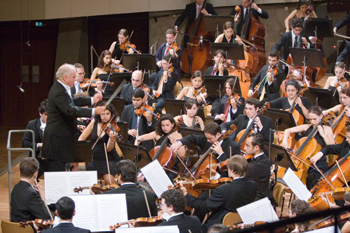By Elie Chalala
The West-Eastern Divan Orchestra’s participation at the Lucerne Festival coincided with the ongoing conflict between Israel and Gaza, the reverberations of which cannot go unnoted by the ensemble.
The West-Eastern Orchestra represents the legacy of Daniele Barenboim, an Israeli musician and conductor, and the late Edward Said, a Palestinian-American academic and activist. According to the Orchestra’s website, the project, founded in 1999, grew out of a workshop targeting young Israeli and Arab musicians with the goal of combining musical study with intercultural collaboration — bridging a divide between peoples and "cultures that traditionally have been rivals."
Further proof of the concerted effort to establish common ground through music is the name of the Orchestra, the “West-Eastern Divan." The title "refers to a collection of poems by the German poet Johann Wolfgang Goethe.” The founders of the Orchestra attribute the intentionality of the name to Goethe, as he “was one of the first Germans to be truly interested in other countries — he started to learn Arabic when he was over 60.”
I do recall many debates and discussions before and after Said's death in 2003, including controversies resulting from his partnership and association with what his critics called the "Zionist" Barenboim. Much, if not all discussions were derived from politics and the underlying approach of the West-Eastern Divan project to transcend music and to create sustainable understanding between Arabs and Israelis. Besides the collaboration with Barenboim, critics also focused on Said's latest position on the solution of the Israel-Palestine question; before his death, Said exhibited a marked change in his thinking by expressing support for a bi-national, one-state solution as opposed to the establishment of separate states for Israel and Palestine. It is crucial to note that Said’s involvement with Barenboim never strictly focused on the political, as he exhibited both an academic and lifelong personal affinity for music. Said was the Nation Magazine's music editor until his death in 2003.
The Orchestra's recent participation in the Lucerne Festival of Switzerland provided the topic of a critic's notebook article by James R. Ostreich in the New York Times ("Arabs and Israelis Find Common Ground a Baton," August 21, 2014). The piece offers an account of the Orchestra’s most recent performance that highlights both successes and strains caused by "external" factors ranging from the decision to play Wagner in Israel to the violence of the current conflict between Israel and Gaza. While the Wagner issue has only caused problems for the Orchestra inside of Israel, the Israel-Palestine issue seems to follow the Orchestra wherever and whenever it tours.
The Orchestra’s performance in the Lucerne Festival constituted an "unqualified success," according to Ostreich's notebook. Yet, there is something about this project that transcends music alone, instead acquiring a special importance in international peace-making efforts. This intention becomes immediately evident in the conceptual genesis of the Orchestra, the ensemble's ethnic makeup and the goals outside of musical performance that the group aspires to achieve. The youth participants in the Orchestra have learned to draw on the social psychological literature that peace must start at the personal level in order to create a successful model for cooperation and coexistence between Israeli and Palestinian citizens. The Orchestra’s model offers the ability for pacifism to begin at a micro-level, in schools and recreational clubs, and then transfer the fruits of collaboration and mutual understanding to higher levels of cooperation involving domestic and international politics.
This year, the Lucerne Festival coincided with the ongoing war between Israel and Gaza, a conflict that has inevitably touched the lives of all members of the ensemble. "The warfare between Israelis and Palestinians is another matter, a potential spur to conflict between Jews and Arabs within the ensemble," wrote Oestreich. Politics have a long history of impacting the ensemble; "Daniel Barenboim recalls that there were serious tensions during the fighting in Gaza in 2005, and that some concerts were postponed, but that none of the players accepted his offer to release them if their misgivings demanded it." At this time, Barenboim has reassured the international community that "there is no tension" in the Orchestra. Yet Barenboim’s quote should not be taken literally, for whatever tension and strain the war has placed on the group was an obstacle "overcome." Violinist Layale Chaker, a Lebanese of Palestinian decent, told the Times, "Of course there are certain strains," but we resolve them "through open dialogue and debate."
Does the Barenboim-Said legacy still live despite the political reverberations that the Orchestra faces on a daily basis? The Times’ critic answers in the affirmative; "Certainly, to judge from the performances here, whatever disunity may exist is left off the concert stage."
This article appeared in Al Jadid Magazine, Vol. 18, No. 67, 2013-2014.
Copyright © 2014 AL JADID MAGAZINE

